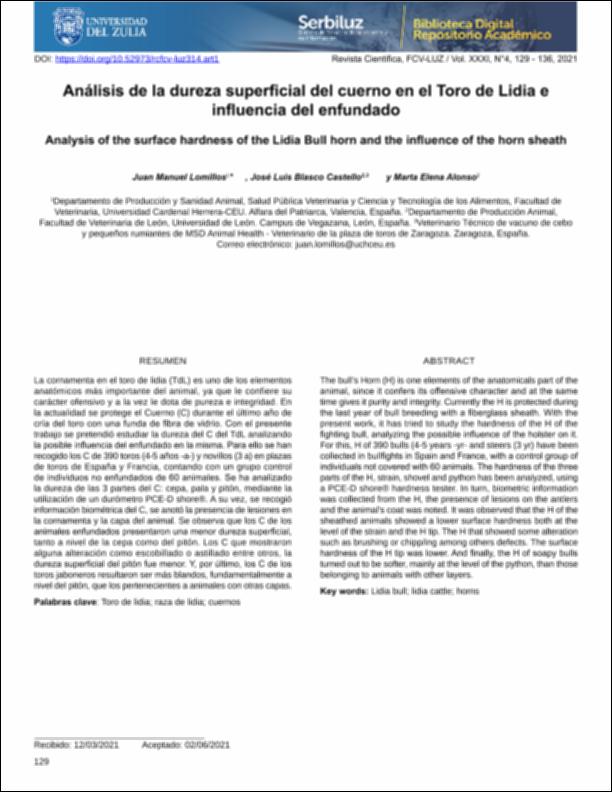Por favor, use este identificador para citar o enlazar este ítem:
http://hdl.handle.net/10637/13485Análisis de la dureza superficial del cuerno en el Toro de Lidia e influencia del enfundado
| Título : | Análisis de la dureza superficial del cuerno en el Toro de Lidia e influencia del enfundado |
| Otros títulos: | Analysis of the surface hardness of the Lidia Bull horn and the influence of the horn sheath |
| Autor : | Lomillos Pérez, Juan Manuel Blasco Castello, José Luis Alonso de la Varga, Marta Elena |
| Materias: | Toros de lidia - Cría y explotación.; Horns.; Cuernos.; Fighting bull - Breeding. |
| Editorial : | Universidad del Zulia |
| Citación : | Lomillos, J.M., Blasco Castello, J.L. y Alonso, M.E. (2021). Análisis de la dureza superficial del cuerno en el Toro de Lidia e influencia del enfundado. Revista Científica Facultad de Ciencias Veterinarias, vol. 31, n. 4 (22 sep.), pp. 129-136. DOI: http://dx.doi.org/10.52973/rcfcv-luz314.art1 |
| Resumen : | La cornamenta en el toro de lidia (TdL) es uno de los elementos
anatómicos más importante del animal, ya que le confiere su
carácter ofensivo y a la vez le dota de pureza e integridad. En
la actualidad se protege el Cuerno (C) durante el último año de
cría del toro con una funda de fibra de vidrio. Con el presente
trabajo se pretendió estudiar la dureza del C del TdL analizando
la posible influencia del enfundado en la misma. Para ello se han
recogido los C de 390 toros (4-5 años -a-) y novillos (3 a) en plazas
de toros de España y Francia, contando con un grupo control
de individuos no enfundados de 60 animales. Se ha analizado
la dureza de las 3 partes del C: cepa, pala y pitón, mediante la
utilización de un durómetro PCE-D shore®. A su vez, se recogió
información biométrica del C, se anotó la presencia de lesiones en
la cornamenta y la capa del animal. Se observa que los C de los
animales enfundados presentaron una menor dureza superficial,
tanto a nivel de la cepa como del pitón. Los C que mostraron
alguna alteración como escobillado o astillado entre otros, la
dureza superficial del pitón fue menor. Y, por último, los C de los
toros jaboneros resultaron ser más blandos, fundamentalmente a
nivel del pitón, que los pertenecientes a animales con otras capas. The bull’s Horn (H) is one elements of the anatomicals part of the animal, since it confers its offensive character and at the same time gives it purity and integrity. Currently the H is protected during the last year of bull breeding with a fiberglass sheath. With the present work, it has tried to study the hardness of the H of the fighting bull, analyzing the possible influence of the holster on it. For this, H of 390 bulls (4-5 years -yr- and steers (3 yr) have been collected in bullfights in Spain and France, with a control group of individuals not covered with 60 animals. The hardness of the three parts of the H, strain, shovel and python has been analyzed, using a PCE-D shore® hardness tester. In turn, biometric information was collected from the H, the presence of lesions on the antlers and the animal’s coat was noted. It was observed that the H of the sheathed animals showed a lower surface hardness both at the level of the strain and the H tip. The H that showed some alteration such as brushing or chipp/ing among others defects. The surface hardness of the H tip was lower. And finally, the H of soapy bulls turned out to be softer, mainly at the level of the python, than those belonging to animals with other layers. |
| Descripción : | Este artículo se encuentra disponible en la siguiente URL: https://www.produccioncientificaluz.org/index.php/cientifica/article/view/36708/39547 |
| URI : | http://hdl.handle.net/10637/13485 |
| Derechos: | http://creativecommons.org/licenses/by-nc-sa/4.0/deed.es |
| ISSN : | 2521-9715 (Electrónico) 0798-2259 |
| Fecha de publicación : | 22-sep-2021 |
| Centro : | Universidad Cardenal Herrera-CEU |
| Aparece en las colecciones: | Dpto. Producción y Sanidad Animal, Salud Pública Veterinaria y Ciencia y Tecnología de los Alimentos |
Los ítems de DSpace están protegidos por copyright, con todos los derechos reservados, a menos que se indique lo contrario.


